Greed and steeds, guns 'n' goons, Mahalaxmi racecourse is a place where one impulse from this green and pleasant land may tell you more of man; of insatiable greed and human flaws than all the sages can
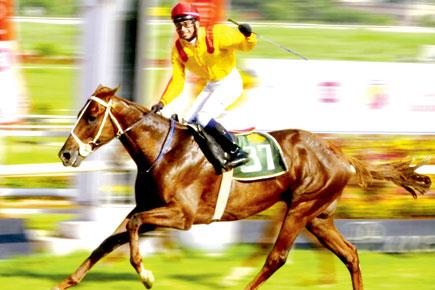
It was a time when Mumbai had mills not malls, and mills had textile workers; there were no BPO workers on the horizon. These workers were regulars at the Mahalaxmi race course, and their racing knowledge could give any aficionado a run for his money.
ADVERTISEMENT
The second enclosure, at the race course, which has a helipad today, was the stand where one could see a large number of mill workers betting on their Sunday off. They were joined by a swathe of tonga wallahs, all race course regulars. In those days, tongas were part of Mumbai's commuting scene, and VT and Dadar Station saw a lot of tongas wait outside.
The Bombay Central area had a large number of stables. Old timers recall the awesome understanding tonga wallahs had about the horses, it came with living and making a living with these animals. Then, races were held only on Sundays and the entry to the second enclosure was for Rs 1. There were crowds close to 12,000 on racing days. Once, a Mumbai cabbie walked away with R 5 lakh in winnings. It was not surprising to see the odd punter winning as much as Rs 40 lakh and 50 lakh, and, getting to keep most of it.

(Today's crippling 33 per cent tax on winnings has a huge part to play in thinning crowds at Mahalaxmi.) Meanwhile, the second enclosure's demise, fallen into disrepair, mirrors the death of the city's textile mills. Today, Mahalaxmi's second enclosure houses a helipad. The favourite landing ground for choppers carrying industrialists and politicians, it is rumoured to give the Royal Western India Turf Club (RWITC) a very substantial income in annual earnings.
Top horse owners' wives, living outside Mumbai, have been known to get into their private chopper whenever the spirit moves them, land at Mahalaxmi, get into a waiting luxury car that whisks them off for an afternoon of shopping. Then, it is back to the bird waiting at the Mahalaxmi which Oh these billionaires and their baubles! But, we digress. Today, the lawn outside the second enclosure is given out for weddings and is called 'The Far Pavilion', raking in some more marriage moolah for the club.
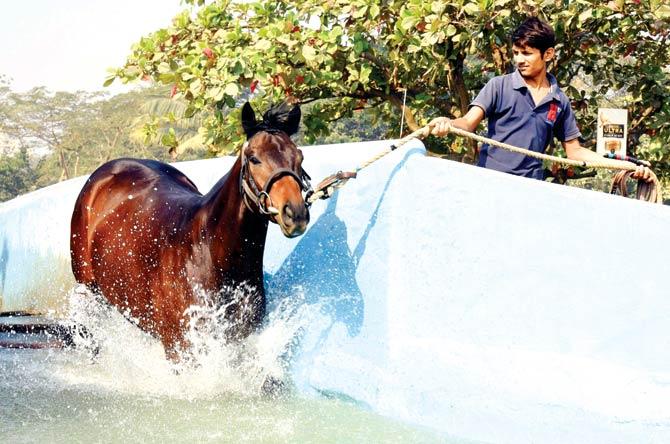
Punters must know when to swim and get out if they are sinking at the betting windows
In 1994, C Rajendra, now a trainer, was champion jockey at Mahalaxmi. This story has three more characters; an apprentice rider with a penchant of passing 'hot' tips to big punters; an underworld don who owned an elite card club in Bandra; and a teenager earning R20/- per day at the racecourse, for updating results of races on a blackboard for the public's benefit.
The apprentice rider overheard a trainer and a foreign rider discussing why the horse Stormy Warrior, trained by Imtiaz Sait, would not win a particular race. The foreigner felt the horse simply did not possess the requisite form to win. Hearing this, the apprentice rushed to the don and told him he could lay against Stormy Warrior as much as he wanted, because the horse would not win. When the don asked how he was so confident, instead of saying he had eavesdropped, the apprentice said the jockey on Stormy Warrior, champion C Rajendra, will ride him to lose. The don insisted he would believe it only if Rajendra himself met him and guaranteed that he would lose. Soon, the apprentice arranged a meeting between the don and "C Rajendra", who promised he would not let Stormy Warrior win, and demanded his share of the booty. The deal was done, or so the don thought.

When the race was run though, to the horror of the don who had risked almost everything he had in the hope of making a killing, Stormy Warrior won by a huge margin. "I must have won by at least 15 lengths," C Rajendra said. "When I reported for work next morning my helper, who used to sleep at the stables, told me he was picked up by 15-20 goons at midnight, and they put a gun to his temple and asked about my whereabouts. The boy said they were claiming I double crossed them, and they would kill me if I didn't made good their huge losses."
Rajendra sensed there was something very wrong, and expressed his apprehension to senior stipendiary steward, the late Dady Adenwalla, who in turn called in Julio Rebeiro, the super cop who was then the chief security consultant to the RWITC. Rebeiro at once took Rajendra to the crime branch and lodged an official complaint.

The thrill of thundering hooves, the adrenalin of a wager, and sometimes the high price of a bet gone wrong
The sleuths, using their own network of informers, soon picked up the don who kept insisting the jockey had personally met him and assured that the favourite would lose. Rajendra, however, kept swearing he was seeing the man for the first time in his life.
Investigations later revealed that the apprentice rider had actually taken a certain Mangesh, who bore a strong resemblance to Rajendra and passed him off as the jockey to the don. Mangesh's job, however, was to write the latest race results on a blackboard near the jockeys' room!
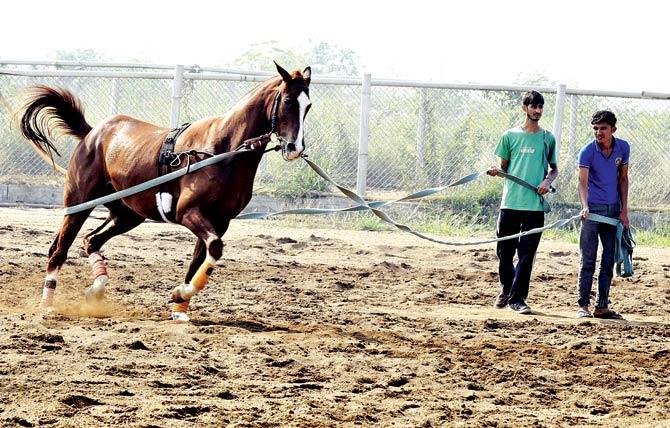
In the end, it is all about the equine, the real champion of this sport
The poor boy, earning only R 20 per day, was promised a share of the booty by the apprentice who had planned the coup. The irony is this bizarre story wouldn't have come to light if Stormy Warrior had genuinely lost the race for some reason! After all, as per a universal statistic, a majority of favourites (7 out of 10) lose their races.
Rewind to 1962-1963 and as was his wont, a Mumbai bank manager withdrew a sum of cash from his bank coffers on a Saturday evening, in time for the Sunday afternoon races. There were two horses that looked promising. One was Rockli and the other was Mt. Everest.
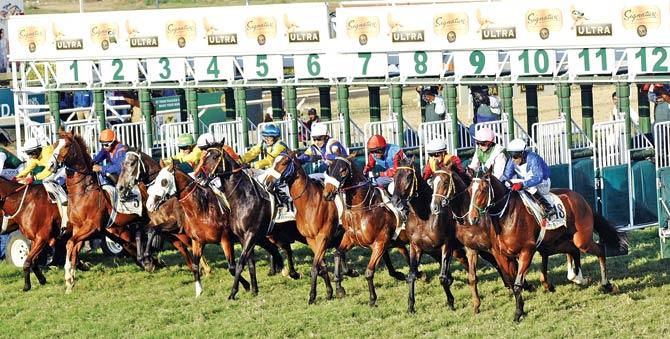
In the early 1940s, the Derby winner got Rs 30,000. Today, he gallops away with Rs 2.17 crore
Our bank manager was certain Mt. Everest would win, so, he placed the bank money he had taken on the horse. Taking money from the bank's account was usual practice for him, and, he saw no reason to deviate from the course now. It was a thrilling finish and, some, to this day, insist that Mt. Everest did win that race. But the photo finish camera at the racecourse failed that day. The jury declared Rockli the winner.
The bank manager looked ashen, recalls one punter, who now spends his time sipping lemon fizz at the Cricket Club of India (CCI) rather than burning his fingers at the betting windows. Monday dawned and the manager was facing unbearable anxiety about how he would return the money to the bank's vault. Unable to face the prospect of humiliation and a possible jail term, it is said that he walked into the Haji Ali Sea. (Some claim it was Chowpatty).
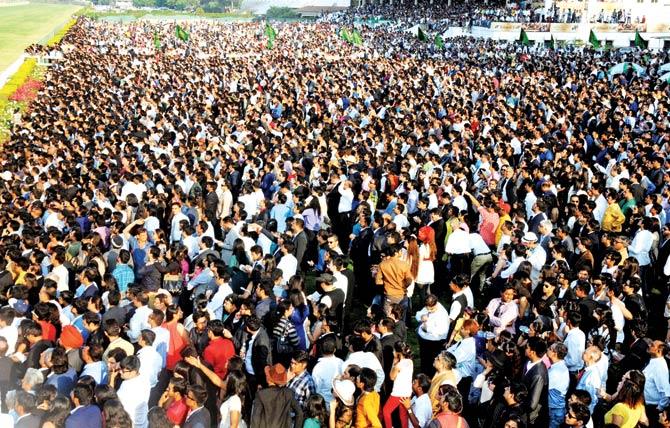
The Derby draws a substantial crowd. These were the numbers seen every Sunday though, decades earlier at the Mahalaxmi. Today, the punter is born free but taxed to death
There is consensus on the fact though, that the manager took his wife and two children along, all four bound together by a long rope as they walked into the sea, letting the waves swallow them, in what is perhaps the most poignant picture of a bet gone horribly wrong. Just opposite the Haji Ali, the green emerald of SoBo gleamed. Traffic, which was considerably thinner in the 1960s, went past the course, motorists blissfully unaware of its fatal lure. This sport, which can make paupers of princes, had claimed yet another. Even today, when a well wisher wants to dissuade a punter on a heat wave at the betting windows, the manager's story is brought up as a cautionary tale.
No one really knows which horse is going to win, certainly not the owner!' the truth of this famous quote by Robert Morley almost gave a heart attack to a Mahalaxmi horse owner who had backed big against his own horse because his trainer had said, "We can't beat the favourite."
Those who know what they are talking about, say the safest race to fix is one where you own one of the two horses who are likely to fight for victory. All you do is ask your jockey to take it really easy and let the other horse win. If you think you are very smart, as this owner thought he was, and because human greed is well, human greed, you can make money both ways: lay against your own horse, back the rival horse, and collect both ways. Simple, no? Not really.
Hoping to make a fortune by losing the race, this owner went to his 'box' at Mahalaxmi to watch the race. Yet, like they say the best laid plans of mice and men often go awry… and what Mr. smug-as-a-bug-in-a-rug did not know though, was that the rival jockey, an Irishman who was a regular at Mahalaxmi until some winters ago, had learnt about his devious plan through a friendly bookmaker. The Irishman decided to make a killing for himself. The favourite's jockey told all his friends to lay against his own horse and back the said horse owner's horse, whose odds had raced from 3-1 to 6-1 as the owner himself was bidding for its loss.
The dextrous Irishman outwitted the owner's horse and jockey, and managed to lose in a photo finish verdict. Punters recall seeing the owner receiving the trophy. Yet, his visage was different from the proud and smiling faces seen on the dais. The owner was sweating profusely and his body was shaking. He was overtly worried about how to settle the bookies' account the next day. The Irishman enjoyed a little chuckle in a corner.
The decade was the 1960s and the Mumbai racing season was off to a galloping start. A journalist who worked as racing correspondent for a prestigious morninger, and who we shall call Leyland, was stopped at the Mahalaxmi gate once, by a staffer for trying to get in without a ticket. "Ticket sir," said the staffer, trying his best clipped Brit accent. Leyland looked incredulous. "Ticket?" he asked the gateman, "I don't need a ticket, I am the press." The gateman looked unimpressed. "Well, then, show me your press pass," he said.
When Leyland said he had forgotten it, the gateman instructed Leyland to go and buy an entrance ticket like ordinary punters, and then access the course. Outraged, Leyland told this gateman loftily, "My face is my ticket to the race course." The quick-witted gateman looked impassive and shrugged, retorting, "Well, sir, I do not know about that. But I have instructions to punch all tickets!" Of such howlers and horses, are stories about the Mahalaxmi made.
 Subscribe today by clicking the link and stay updated with the latest news!" Click here!
Subscribe today by clicking the link and stay updated with the latest news!" Click here!






